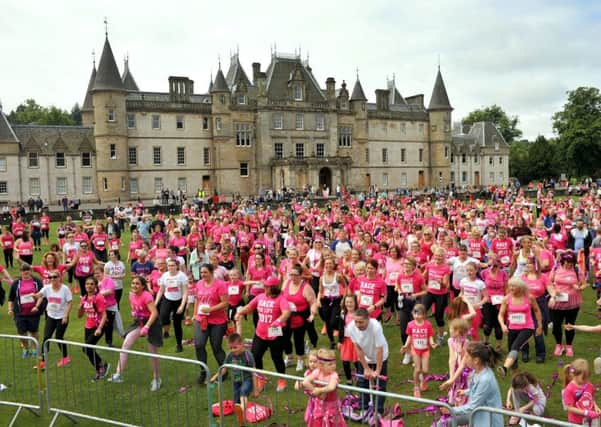IN PICTURES: Falkirk Race for Life 2017


The annual Falkirk Race for Life event took place on Sunday morning – but this year there was a twist and it was no longer solely for females.
Organised by Cancer Research, in partnership with Tesco, this year the charity was trialling a Family 5k which is open to men, women, boys and girls. Once again Race for Life, which across the UK raises millions of pounds every year to help fund life-saving cancer research, brought in the crowds.
Advertisement
Hide AdAdvertisement
Hide AdSome walked, some jogged, others, like Carole Smillie who was first over the line, ran. There were tots in buggies or holding on to mum’s hand, dogs side-by-side with their owners, several generations of the same family, all were there to fundraise and many of them were doing it in memory of someone who had lost their battle with cancer.
Katie Palmer, area events manager with Cancer Research UK said almost 1000 people took part on the day across the 5k and the new Family 5k.
She added that it is hoped £77,000 will be raised by all those involved in Sunday’s event.
Katie said: “Every day, 88 people are diagnosed with cancer in Scotland. Together, we can stop this devastating disease in its tracks.”
Advertisement
Hide AdAdvertisement
Hide AdRace for Life is the UK’s largest fundraising event series with over 350 events around the UK from May to October. In 2017, Cancer Research UK hopes to recruit 475,000 women and raise £48 million to help fund life-saving work. Race for Life started as one event in 1994 at Battersea Park with 680 participants.
Cancer Research UK is the world’s leading cancer charity dedicated to saving lives through research. The charity has been at the heart of the progress that has already seen survival in the UK double in the last forty years. Today, two in four people survive their cancer for at least ten years. Cancer Research UK’s ambition is to accelerate progress so that by 2034, three in four people will survive their cancer for at least ten years.